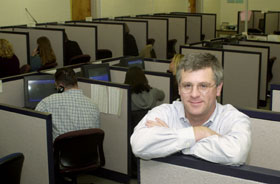For more archives, go to the Advance Archive/Search Page.
For Polling Center, Public Opinion
Counts In More Ways Than One
I'm calling from the University of Connecticut. We are conducting a survey on issues facing the state. May I have a few minutes of your time to get your opinions?
 |
Ken Dautrich, director of the Center for Survey Research and Analysis, says making public opinion data available to elected leaders strengthens the role of the people in the political system.
Photo by Dollie Harvey
|
During the last several months, that phrase has been repeated on the telephone thousands of times on behalf of the Center for Survey Research and Analysis (CSRA).
Any political season is tremendously busy for pollsters, but this year has become particularly demanding, owing to the ethics controversy enveloping Gov. John G. Rowland and his administration.
The polling center, located on the second floor of the Monteith Building, is a non-partisan, non-profit survey research facility. Its stated mission is to advance the role of public opinion in policy-making and social science scholarship.
"In a democracy there is a huge demand for public opinion data," says Ken Dautrich, the center's director. "There is a natural desire to know what the public thinks. Journalists, politicians, lawmakers, foundation boards, and the general public hunger for data, particularly survey data."
That hunger is well fed by the center, which now pulls in contracts worth nearly $3 million annually; supports a full time staff of 11; funds 10 graduate students; and provides part-time work for 160 undergraduates, who are trained on-site to conduct telephone surveys.
"Every year since the beginning, we've increased our client list," says Christopher Barnes, who, as associate director, runs the center's day-to-day operations. "We're getting better at what we do, and better known for it.
"Policy leaders in Connecticut and nationally use our research to make critical public policy decisions," he adds.
Sam Best, also an associate director of the center, and Dautrich hold faculty positions in the political science department and, as part of the center's mission, teach graduate courses in the masters degree program in survey research.
The center was established in 1997 as an offshoot of the Roper Center, a vast archive of public opinion data collected from sources around the world. From the beginning, Dautrich has been at the helm and is widely recognized in the media for his analysis of the UConn Polls.
This series of surveys, funded by the Provost's office, scientifically document what Connecticut residents think about key issues and political candidates, and are disseminated as a public service. Since mid-December, the UConn Polls have gauged public sentiment about the Governor's actions and future; the democratic presidential race; solutions to prison overcrowding; proposed tax increases; and potential spending cuts.
"No elected leader should make decisions based on our poll or any other poll," says Dautrich, "but making public opinion available to them before they cast a vote promotes the role of the people in the political system."
Although the UConn Polls tend to make the biggest headlines, they account for less than 10 percent of the center's work.
CSRA's client list is long and varied. It includes federal agencies, such as the U.S. Dept. of Homeland Security; state governments, including New York and New Jersey; just about every Connecticut state agency; and scores of municipalities. Non-profit agencies are also turning to the center for vital information.
One client is the John S. and James L. Knight Foundation, which sponsors programs to improve journalism throughout the country. The foundation has a $900,000 contract with CSRA to conduct a study of high school students, teachers, and principals in 350 schools nationwide, to look at whether journalism education contributes to an appreciation for free press and free speech.
Projects like these, says Dautrich, offer far more to the center and the University than funding. The projects often lead to interdisciplinary collaboration among faculty members and graduate students, and the contracts generally include money for scholarly products, such as journal articles.
In the case of the Knight Foundation grant, Dautrich is the co-principal investigator with David Yalof, an associate professor of political science, and Richard Schwab, dean of the Neag School of Education. The team will write several academic papers and a book based on the Knight Foundation data.
"It's a real give-and-take effort between our center and the University," says Dautrich.
Sometimes the center reaches out to faculty to seek their consultation
in a project. Other times faculty members come to the center when they need public opinion for their research.
"It's been a great run for us," says Dautrich. "The combination of the services and education we provide, in addition to the Roper Center resources, makes UConn a leader in public opinion research and education."

